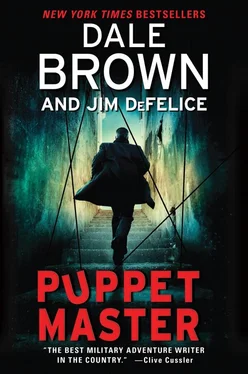Reasonably sure that he wasn’t followed into the café, Tolevi left and continued walking, heading toward a small park a few blocks from the hotel. He found a bench near some children playing on a swing, and once again scanned the area for a tail. Still not seeing one, he walked a few more blocks to a store that sold prepaid telephones. He bought one, then summoned a taxi.
Twenty minutes later, Tolevi arrived at an early-Soviet-era apartment building. After the cab turned the corner, he walked around the block, turned left, and went into a gray four-story building that smelled of simmering cabbage. He walked up a flight, paused one last time to make sure he wasn’t being followed, then went up to the top floor and knocked on the door of an apartment at the far end of the hall.
The man who answered the door nearly dropped the cigarette from his mouth when he saw Tolevi. He grabbed it, then spread his arms wide to embrace him.
“What? What are you doing here?” asked the man, ushering him inside.
“Business, Grandpa. Business.”
Denyx Fodor was not Tolevi’s real grandfather, but he had known Tolevi as a baby, and the families had once been close enough to earn that sort of endearment. They had not seen each other since Tolevi’s last visit to Donetsk, and Fodor cataloged the changes with some relish over a bottle of French wine. The old man still had a store of bottles left over from the days when he imported it; that business had crashed during Ukraine’s depression, which had preceded the revolution and then been deepened by it. Now he was semiretired, with small interests in two shops in town; the proceeds paid his rent but not much more.
Tolevi waited patiently through Fodor’s stories, mostly of rebel and Russian outrages, then explained the outlines of the deal he had come to make, carefully leaving out the business in the restroom, as well as the CIA mission.
“We can get medicine at the pharmacies,” said Fodor. “But not reliably. And the quality — I think it is Chinese.”
“This will be from the West,” said Tolevi.
“You can get past the embargo?”
Tolevi shrugged. “There are ways.”
“And what do you need of me?”
A ride to a place where using the cell phone would not be a problem either for Fodor or anyone else, and a set of eyes to watch for anyone following. Fodor was more than game.
They finished the wine while waiting for the sun to go down, then went out to Fodor’s car, a ten-year-old Lexus. A half hour later they stopped near a railroad siding that had not been used since before the civil war.
Tolevi walked down the tracks for five minutes before making the call to the number Johansen had given him. There was no answer.
He was walking back, considering what to do, when a text arrived with an address and the words “butcher shop” in Ukrainian.
Right. Pick up some meat. Ironic and yet fitting at the same time.
“I need another stop, please,” he told Fodor when he got back to the car. “And go over the river so I can throw the phone away.”
Boston — that day
Gestapo Bitch’s real name was Joyce Kilmer, “like the lady who wrote about the tree.” She had been a CPA with a running fetish until she’d broken her leg.
Learning how to properly rehab after the injury had taken her quite a while, until she’d found the right specialist. It had convinced her she could do better.
“What did you learn from the Marines?” asked Johnny Givens as they warmed down after his Saturday morning run. Kilmer had surprised him by joining him.
More of a surprise was the fact that she didn’t bark at him, only laugh.
“Let’s just say she pushed me,” said Kilmer. “Then I met Mr. Massina.”
“You work for him, not the hospital?”
“That’s right. Keep walking. We need two circuits. Then we’ll work on some core exercises.”
They completed the walk, then began doing some exercises. Sweat flowed from Johnny’s pores.
“All right,” she announced suddenly. “You’re done.”
“Really?”
“Until five o’clock, yes. Kale smoothie for lunch. Don’t forget your medicine.”
“I can’t forget that.”
“It’s important. Your body has been through enormous trauma. You’ve come a long way very fast — too fast, probably. But there’s no going back. Just stick with the program.”
They walked back to the building in silence.
“I didn’t know you worked Saturdays,” he told her as they reached the door.
“I don’t. But you’re my prize pupil.” She smiled.
“Is that why you’re being so nice?” he asked as the door flew open.
“Don’t worry. I’ll keep kicking your ass. But…” She paused. “They’re going to release you this week. I wanted to make sure you’re OK with that.”
“Really?”
“Technically, there’s no reason for you to be in the hospital. The amount of recovery you’ve done, the stage you’re at — it would be, well, two months at least. But physically, you’re there. So, a hospital being a hospital, they’re ready to let you go.”
“Wow.”
“But you have to keep up with the program.”
“I will. There’s no doubt about that.”
“Good.”
“Are you going to still work with me?” Johnny asked.
“You’ll be assigned a new therapist. Two, probably. The post-release team likes to work in pairs.”
“But I was just starting not to hate you.”
“Time for you to fly, little bird. Fly, fly, fly.” She patted him on the back. “You’re on your own.”
* * *
Despite what he told her, Johnny didn’t feel ready. He didn’t think he’d ever be ready. So when he saw Sister Rose Marie waiting in his room when he got back, Johnny felt something close to panic.
“How are you?” asked the diminutive nun.
“Good.”
“You’ve come a long way. How do your legs feel?”
“Strange.” He laughed. “Very strange, still. But — I guess this is how life is going to be.”
“It is.”
“You guys have treated me really well.”
“It’s what we do,” said the nun sweetly. “We’re thinking of releasing you.”
“Ms. Kilmer told me.”
“How do you feel about that?”
“I don’t know.”
The nun nodded solemnly. “We’ll continue to see you on an outpatient basis. We have a therapist I’d like you to work with.”
“Ms. Kilmer has been pretty good. I’d like to keep working with her.” Johnny sat on the edge of the bed.
“The therapist I was talking about is a psychologist. Because there are issues.”
“Like what?”
“He’ll talk to you about that. There are adjustments. But physically… Johnny, you’ve done more in two weeks than a lot of our patients do in six months. Partly, it’s the drugs and the legs themselves — Mr. Massina’s work is quite incredible. But most of it is due to you. Even so… you do have adjustments you have to make. Mentally.”
“Sure.”
“Are you a religious man, Johnny?”
“I’m not Catholic, Sister.”
“I’m not trying to convert you,” she said gently, “but I do believe that faith can be a powerful component of healing.”
Johnny didn’t know how to answer that.
“You’re still angry with God, I would imagine, for doing this to you,” said the nun. It was as if she read his mind. But maybe that wasn’t so hard to figure out.
“It is what it is,” he said.
“God only gives us what He knows we can handle,” she told him.
“I guess.”
“Nurse Abramowitz will be in to help with out-processing Monday,” said the nun. “She’s Jewish, by the way.”
“Does that make a difference?”
Читать дальше












